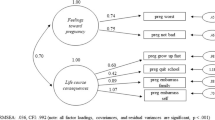Abstract
Twenty-five pregnant and/or parenting adolescents were compared with sixteen nonpregnant adolescents on two irrationality measures: The Child and Adolescent Scale of Irrationality and the Adolescent Pregnancy Beliefs Questionnaire. Findings suggest that pregnant adolescents subscribe to a greater number of general irrational beliefs; to a greater number of irrational beliefs specific to sex, dating and birth control; to a greater number of beliefs consistent with promoting pregnancy; and to fewer beliefs that might deter pregnancy when compared to never pregnant adolescents.
Similar content being viewed by others
References
Barth, R., & Schinke, S. (1984). Enhancing the social supports of teenage mothers.Social Casework: The Journal of Contemporary Social Work, 65, 523–531.
Bernard, M., & Laws, W. (1981).A child and adolescent scale of irrationality. Victoria, Australia: Department of Education, University of Melbourne.
Cobliner, W. (1974). Pregnancy in the single adolescent girl: The role of cognitive function.Journal of Youth and Adolescence, 3, 17–28.
Gerrard, M., McCann, L., & Fortini, M. (1983). Prevention of unwanted pregnancy.American Journal of Community Psychology, 11, 153–167.
Goldfarb, J., Mumford, D., Schum, D., Smith, P., Flowers, C., & Schum, C. (1977). An attempt to detect “pregnancy susceptibility” in indigent adolescent girls.Journal of Youth and Adolescence, 6, 127–144.
Goldsmith, S., Gabrielson, M., Gabrielson, I., Mathews, V., & Potts, L. (1972). Teenagers, sex and contraception.Family Planning Perspectives, 4, 32–38.
JR.-SR. High School Personality Questionnaire. (1968). Champaign, IL: Institute for Personality and Ability Testing.
Ktsanes, V. (1980). The teenager and the family planning experience. In C.S. Chilman (Ed.),Adolescent Pregnancy and Childbearing: Findings from research (pp. 83–100). Washington DC: U.S. Department of Health and Human Services.
Marcy, S., Brown, J., & Danielson, R. (1983). Contraceptive use by adolescent females in relation to knowledge, and to time and method of contraceptive counseling.Research in Nursing and Health, 6, 175–182.
Marecek, J. (1987). Counseling adolescents with problem pregnancies.American Psychologist, 42, 89–93.
Morrison, D. (1985). Adolescent contraceptive behavior: A review.Psychological Bulletin, 98(3), 538–568.
Patten, M. (1981). Self concept and self esteem: Factors in adolescent pregnancy.Adolescence, 16, 765–778.
Schinke, S., Gilchrist, L., & Small, R. (1979). Preventing unwanted adolescent pregnancy. A cognitive-behavioral approach.American Journal of Orthopsychiatry, 49, 81–88.
Smith, P., Nenney, S., Weinman, M., & Mumford, D. (1982). Factors affecting perception of pregnancy risk in the adolescent.Journal of Youth and Adolescence, 11, 207–215.
Westphal, K. & Wagner, S. (1988, April).A five factor cognitive model of adolescent pregnancy. Paper presented at the meeting of the National Association of School Psychologists, Chicago.
Zabin, L., Hirsch, M., Smith, E., Streett, R. & Hardy, J. (1986). Evaluation of a pregnancy prevention program for urban teenagers.Family Planning Perspectives, 18, 119–126.
Zelnik, M. & Kim, Y. (1982). Sex education and its association with teenage sexual activity, pregnancy and contraceptive use.Family Planning Perspectives, 14, 117–126.
Author information
Authors and Affiliations
Additional information
Karen Westphal holds a Ph.D. in School Psychology from the University of South Carolina. She is an Assistant Professor of Psychology, Department of Psychology, Cleveland State University, Cleveland, Ohio.
Susan Wagner worked with Dr. Westphal on this research while she was a graduate student at Cleveland State University. She is presently employed in the Mood Disorders Research Project at University Hospitals, Cleveland, Ohio.
Rights and permissions
About this article
Cite this article
Westphal, K., Wagner, S. Differences in irrational beliefs of pregnant and never pregnant adolescents. J Rational-Emot Cognitive-Behav Ther 11, 151–158 (1993). https://doi.org/10.1007/BF01074092
Issue Date:
DOI: https://doi.org/10.1007/BF01074092




